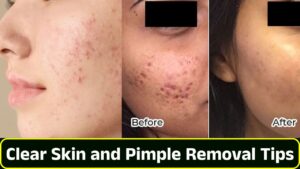Clear Skin and Pimple Removal Tips
Clear Skin and Pimple Removal Tips
Achieving and maintaining clear skin is a common goal, especially for those dealing with pimples. This comprehensive guide provides insights into understanding, preventing, and treating acne while building a sustainable skincare routine. Here’s a summary of essential tips for clear skin and effective pimple management.

Understanding Pimples
Pimples, or acne, occur due to clogged pores, excess oil production, bacteria, or inflammation. They can manifest in various forms, such as blackheads, whiteheads, or cystic acne. Factors contributing to pimples include hormonal imbalances, genetics, diet, stress, and poor hygiene. Knowing your skin type—oily, dry, combination, or sensitive—is crucial in selecting the right care strategies.
Daily Skincare Routine
A consistent skincare routine tailored to your skin type is key to preventing and treating acne:
- Morning Routine:
- Cleansing: Use a gentle cleanser to remove dirt and oil.
- Toning: Balances the skin’s pH and tightens pores.
- Moisturizing: Choose a lightweight, non-comedogenic product.
- Sunscreen: Protects against UV damage, which can worsen acne scars.
- Evening Routine:
- Remove makeup thoroughly with micellar water or oil-based cleansers.
- Double cleanse to remove residual dirt and impurities.
- Apply a repairing serum or night cream for skin healing.
- Weekly Care:
- Exfoliate once or twice a week to remove dead skin cells.
- Use face masks with natural ingredients like clay or charcoal to detoxify.
Natural Remedies for Pimples
Home remedies can complement your skincare routine:
- Aloe Vera: Soothes inflammation and hydrates.
- Tea Tree Oil: Acts as a natural antibacterial agent.
- Honey and Cinnamon Masks: Help fight bacteria and reduce scars.
- Turmeric and Yogurt Masks: Reduce redness and brighten skin tone.
Additionally, a balanced diet plays a vital role in skin health. Foods rich in antioxidants, omega-3 fatty acids, and vitamins support clear skin, while sugary, processed, and dairy products should be minimized. Staying hydrated helps flush out toxins, contributing to a radiant complexion.
Medical Treatments for Acne
For persistent or severe acne, medical treatments may be necessary:
- Over-the-Counter Products:
- Benzoyl Peroxide: Reduces bacteria and dries out acne.
- Salicylic Acid: Unclogs pores and removes dead skin.
- Retinoids: Promotes cell turnover to prevent clogging.
- Prescription Medications:
- Topical Antibiotics: Reduce inflammation and bacterial growth.
- Oral Antibiotics or Hormonal Treatments: Used for severe cases.
- Isotretinoin (Accutane): A potent solution for stubborn acne.
- Professional Treatments:
- Chemical peels and microdermabrasion exfoliate the skin deeply.
- Laser treatments target scars and reduce active acne.
Lifestyle Changes for Clear Skin
Clear skin is not just about skincare products; lifestyle habits matter:
- Stress Management: Practices like yoga, meditation, and regular exercise lower stress levels, which can trigger acne.
- Hygiene: Wash pillowcases, towels, and makeup tools frequently. Avoid touching your face unnecessarily.
- Sleep: A consistent sleep schedule supports skin repair and renewal.
- Avoiding Irritants: Opt for non-comedogenic makeup and skincare products to prevent clogged pores.
Caring for Acne Scars
Treating acne scars requires patience and the right techniques:
- At-Home Remedies: Ingredients like aloe vera, rosehip oil, and vitamin C lighten scars over time.
- Professional Options: Microneedling, laser resurfacing, and fillers effectively treat deeper scars.
Debunking Myths About Pimples
Many misconceptions about acne persist, including:
- Myth: Chocolate and greasy foods cause pimples.
- Fact: While diet plays a role, these foods are not direct causes.
- Myth: Popping pimples makes them heal faster.
- Fact: This worsens inflammation and increases scarring.
- Myth: Tanning cures acne.
- Fact: Tanning can temporarily mask redness but ultimately damages the skin.
It’s essential to separate fact from fiction to make informed skincare choices.
Skin Care for Different Age Groups
Skin needs vary by age:
- Teenagers: Hormonal changes often trigger acne. Focus on gentle products and early skincare habits.
- Adults: Stress and hormonal imbalances can lead to breakouts. Incorporate anti-aging products alongside acne treatments.
- Seniors: Dryness is a common concern. Gentle cleansers and rich moisturizers help maintain skin health.
Recommended Products
Both affordable and high-end skincare products are available for acne-prone skin. Look for items with active ingredients like salicylic acid, niacinamide, or hyaluronic acid. For budget-friendly options, drugstore brands offer effective cleansers, toners, and moisturizers.
Prevention Tips
Preventing future breakouts involves:
- Maintaining a consistent skincare routine.
- Adapting products to suit seasonal changes.
- Visiting a dermatologist for regular check-ups.
By combining these practices with a healthy lifestyle, you can enjoy long-term skin health.
Conclusion
Achieving clear, pimple-free skin requires a holistic approach, balancing skincare, medical treatments, and healthy lifestyle habits. While results may take time, consistency and patience are key. With proper care, you can enjoy a radiant and healthy complexion.
If you’d like further refinements or additional sections, let me know!
